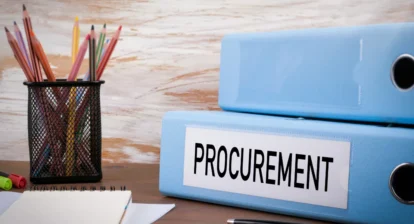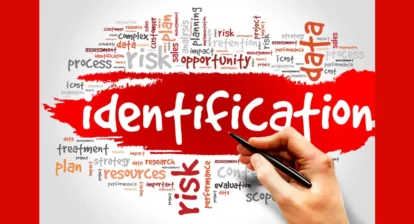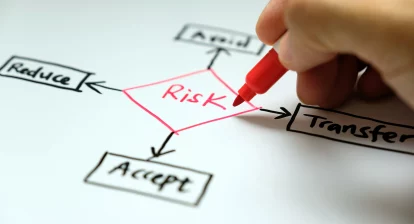Please find below highlights from Satya Narayan Dash’s Webinar: From Aspiring RMP to Actual RMP – What Does It Take? being provided by MPUG for the convenience of our members. You may wish to use this transcript for the purposes of self-paced learning, searching for specific information, and/or performing a quick review of webinar content. The article below may have inclusions, such as additional information or context provided on specific topics, or exclusions, such as those steps included in product demonstrations. You may watch the live recording of this webinar at your convenience.
Risk management is the process of identifying, analyzing, and preparing for risk. It includes procedures and policies designed to minimize exposure to risk and maximize an organization’s ability to function in the face of uncertainty.
Risk management is a critical component of any organization’s operations. It helps decision-makers take an objective, systematic approach to identify and address risks. By taking steps to reduce exposure to risk, organizations can protect their employees, customers, reputation, and bottom line.
Risk management is a critical function for all organizations. By validating your skills and becoming a risk specialist, you can help your organization mitigate risks and protect its assets.
PMI’s Risk Management Professional (RMP®) certification has been the fastest-growing certification from 2020 to 2022. In September 2020, the number of RMPs worldwide was around 6,000. By the end of August 2022, that number doubled to over 12,000. Such a rapid growth rate has not been seen for any other PMI certification in years.
Value of a PMI-RMP Certification
The PMI-RMP certification is a globally recognized credential that signifies that an individual has the skills and knowledge to effectively manage risk in organizations. The credential is awarded by the Project Management Institute (PMI), the world’s leading project management organization.
The PMI-RMP credential is highly valued by organizations because unlike other RMP certifications, the PMI-RMP is not easy to obtain. Holding a PMI-RMP credential can help you advance your career and improve your earnings potential. The credential can also help you stand out from other candidates when competing for jobs.
In recent times it has become common to see Project Managers who are also certified as PMI-Risk Management Professionals, indicative of the value of an RMP Certificate.
This RMP certification is specialized, but it can be applied to many different industries. I’ve had students from pharmaceuticals, construction, banking, and software development in my class, and they all found the certification valuable. The exam is mostly situational and scenario-based, which gives people who have the certification an advantage.
RMP credential is globally accepted because PMI has a presence in over 200 countries.
The PMI-RMP Exam
The exam for the RMP certification is composed predominantly of situational and scenario-based questions in order to test the applicant’s ability to apply risk management theory to real-world scenarios. The exam is a test of your stamina and patience as well as your understanding of risk management theory.
It is aligned with various risk management standards, such as the foundational standards, the PMBOK Guide, 6th and 7th editions, Practice Standards, and Standards for Educational and Psychological Testing. The psychological evaluation component of the exam is designed to ensure that only those who are psychologically fit to be risk managers are accepted into the program.
It evaluates your prior academic and work experience in risk management.
RMP Certification Applicability
The RMP certification is applicable to risk managers, risk analysts, and chief risk officers. This certification is new and becoming increasingly popular in the banking, financial, and fintech industries. CROs are new phenomena prevalent in banking, financial, and fintech industries and are equivalent to CEOs or CFOs in terms of level and responsibilities.
This certification is also applicable to product managers, project, program, or portfolio managers, and senior executives across industries. If you’re a team member, engineer, or software developer, you can also go for the RMP certification.
The certification exam can be taken by anyone, not just management professionals.
How do you become a PMI-RMP
To become a PMI-RMP, you must first meet the eligibility requirements, which include having a certain level of education and professional experience. Once you have met the eligibility requirements, you can then apply to take the PMI-RMP exam. Once you have passed the exam, you will be credentialed as a PMI-RMP.
PMI RMP Exam Education Requirements
To be eligible for the exam, candidates need to meet the following Education Requirements :
Path A: Secondary degree (high school diploma, associate’s degree, or the global equivalent)
Path B: Four-year degree
Path C: Bachelor’s or postgraduate degree from a GAC-accredited program
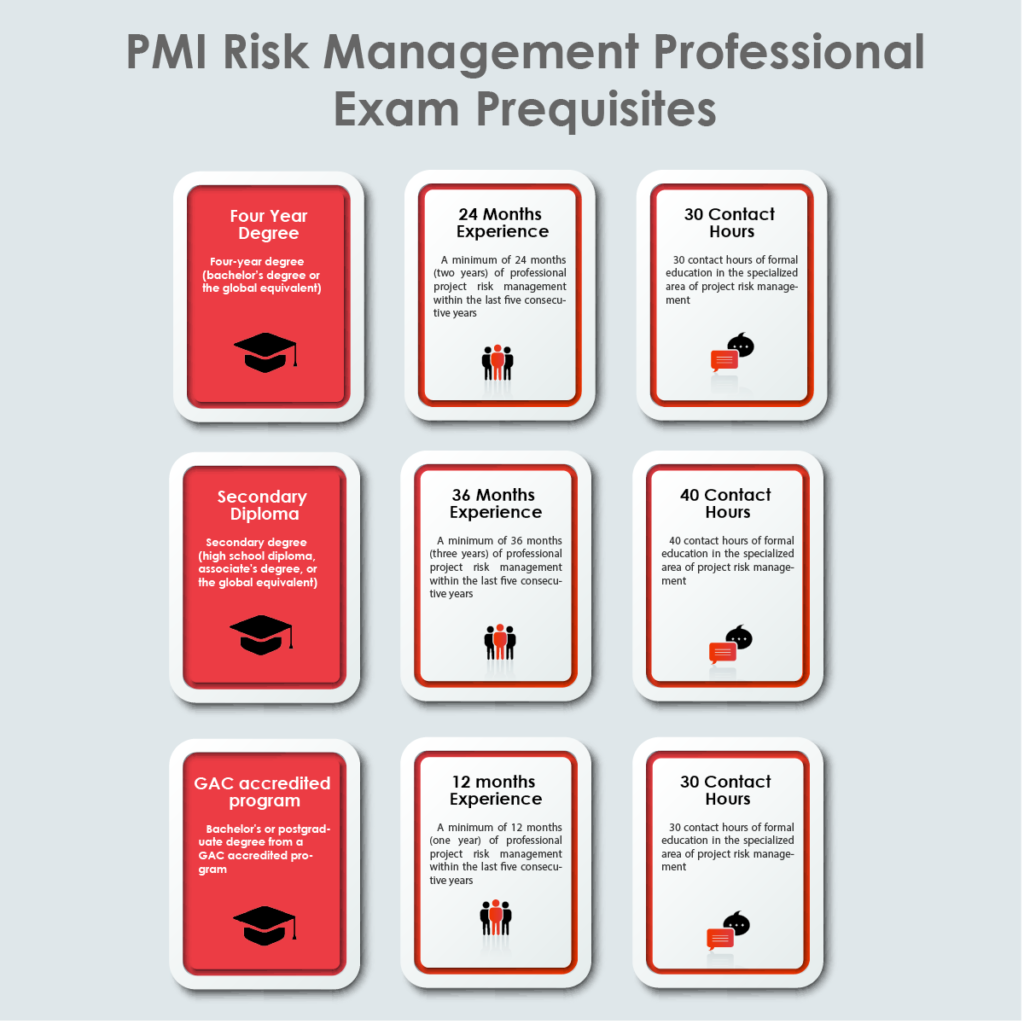
Based on your level of formal education, PMI requires you to have a minimum amount of contact hours of formal education in the specialized area of project risk management as well as a minimum amount of professional project risk management experience.
Requirements if you have a Four-year degree:
- A minimum of 24 months (two years) of professional project risk management within the last five consecutive years
- 30 contact hours of formal education in the specialized area of project risk management
Requirements if you have a Secondary Diploma or a global equivalent :
- A minimum of 36 months (three years) of professional project risk management within the last five consecutive years
- 40 contact hours of formal education in the specialized area of project risk management
Requirements if you have a Bachelors or Postgraduate degree from a GAC-accredited program :
- A minimum of 12 months (one year) of professional project risk management within the last five consecutive years
- 30 contact hours of formal education in the specialized area of project risk management
Important things to note about the PMI RMP Exam Prerequisites
- Experience must be non-overlapping. What this means is that you can not claim two years of experience for projects that lasted a year each during the same time period.
- Experience does not mean that you are a designated risk manager or a designated risk analyst or a program manager or the portfolio manager or the chief risk officer. You can be a software developer, or you can be a construction engineer. You can be a pharmaceutical scientist, you are eligible for RMP.
- Experience should be in five performance domains, as mentioned in the examinee content outline, we are going to shortly see this examination content outline and these five performance domains.
If you meet the prerequisites, that is an educational experience, your professional risk management experience, and the contact hours of learning then your prerequisites for the PMI Exam are met.
After you fill out and submit your application form, it will be reviewed by PMI. If your application is approved, you will become a candidate for the RMP credential and will be able to take the exam. The examination fee for PMI members is $520.00, and the fee for non-members is $670.00. You can also become a member of PMI, which has an annual fee of $129.
After you complete your application form, it will need to be approved. You will then have one year to take the exam. Within that one year, you will get three attempts, including the first attempt. This allows you to retake the exam if you don’t pass on your first try.
The fee is $334 for remembers and $435 for non-members.
Overview of the RMP Exam Process
Application Submission
The first step in the RMP examination process is to submit your application form. You can do this by going to PMI.org and opening your application form. Once you start the form, you will have days to submit it.
Application Completeness Review
After you submit the form, it will be checked for completeness by PMI. This usually takes five business days if you submit it online. If your application is approved after the completeness review, then you are a candidate for the PMP exam and can make the payment and schedule the exam.
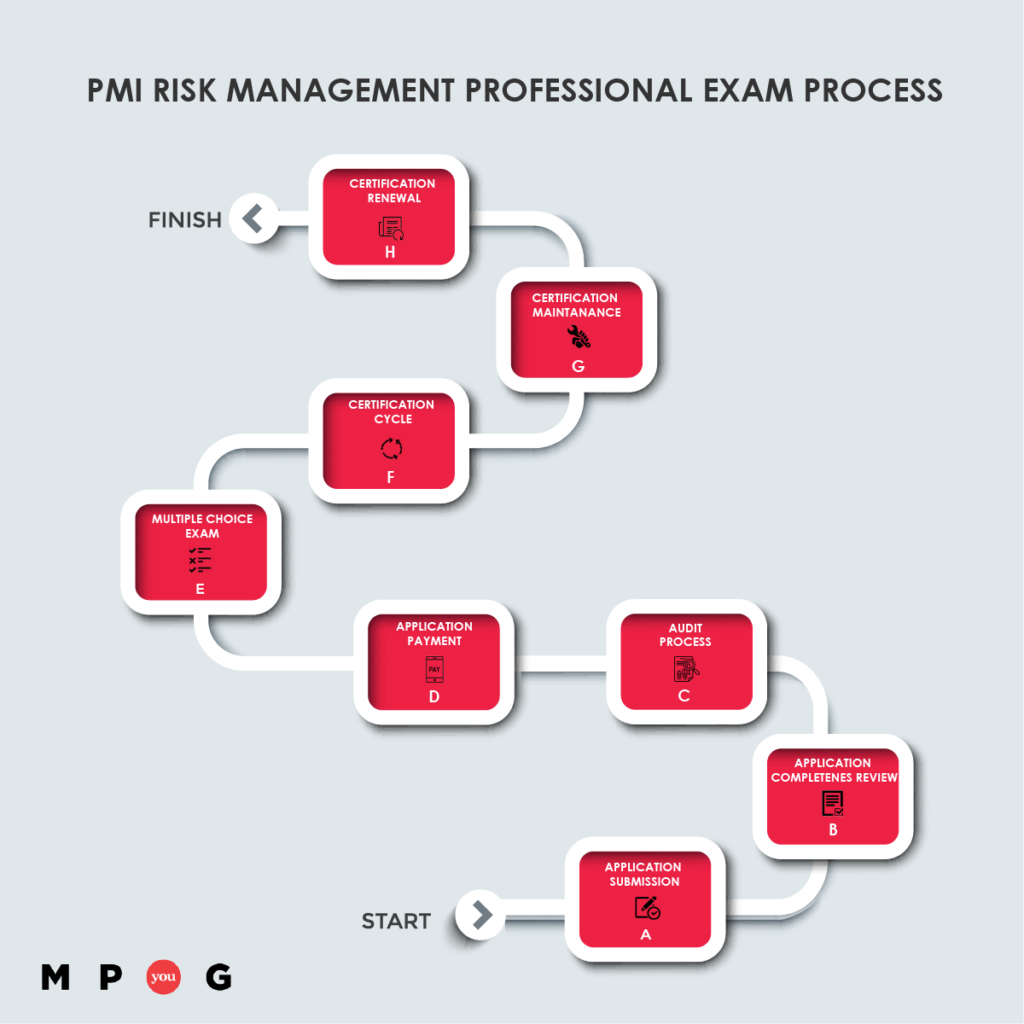
Audit Process
It’s possible that your application will be selected for audit after it has been reviewed for completeness. Audit selection is random. If your application is selected, you’ll have 90 days to submit all the required documentation to PMI, including your educational details, professional experience, contact hours, and certificates from providers. All documentation must be submitted via snail mail to PMI’s office in Pennsylvania.
Application Payment
After your payment has been approved, you can schedule your exam. The exam consists of 115 multiple-choice questions. each question consists of 4 options, with one correct answer.
Multiple Choice Exam
The RMP exam has changed significantly in recent months, and they have introduced a new type of question called a multi-response question. A multi-response question will have 6 to 7 options, out of which 2 or 3 answers could be correct. It is also possible to get fill-in-the-blank questions. So you’ll have multiple choice, multi-response, and fill-in-the-blank questions in your exam.
Click here to see how you can earn free PMI PDUS with MPUG
Certification LifeCycle
Once you pass the PMI RMP exam you become a PMI-certified RMP. Your PMI-RMP Certificate is valid for 3 years after which it needs to be renewed.
Certification Maintenance
Your PMI RMP certification is valid for three years. To renew your certification after the initial three-year cycle, you must earn 30 PDUs. You can earn these PDUs at any time during the three-year period. If you earn the required PDUs before your certification expires, your PMI RMP certificate will be renewed for another three years.


